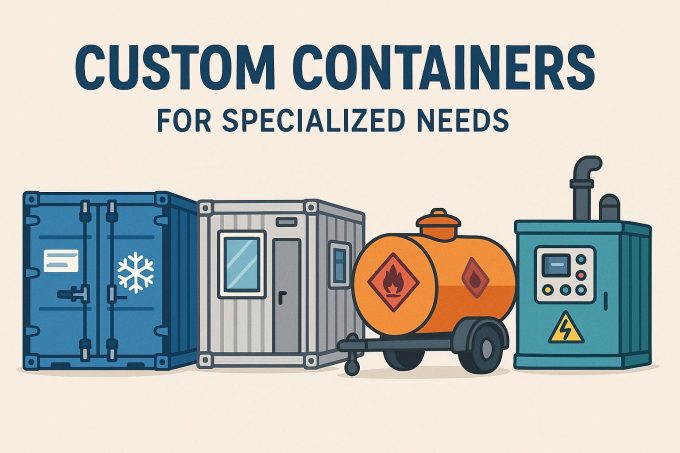Understanding Custom Containers for Specialized Needs
Custom containers have emerged as a versatile solution, catering to the nuanced demands of various industries. Unlike standard containers, which are mass-produced to meet generic needs, custom containers are meticulously designed and constructed to satisfy specific requirements. This adaptability makes them a valuable asset, offering substantial benefits in terms of efficiency, functionality, and optimization.
Applications of Custom Containers
The deployment of custom containers spans numerous sectors, each harnessing the unique advantages these containers present. In the pharmaceutical industry, for instance, maintaining stringent temperature controls is paramount for preserving the efficacy of pharmaceuticals. Custom containers are tailored to accommodate these specific thermal needs, thereby ensuring product integrity and compliance with regulatory standards. This level of customization is not feasible with generic, one-size-fits-all solutions.
In the manufacturing realm, custom containers are engineered to align perfectly with production environments. They can be designed to fit into unconventional spaces or to house specialized machinery, thus optimizing the manufacturing process by reducing downtime and enhancing workflow efficiency. This targeted approach facilitates smoother operations, integrating seamlessly with existing systems.
The logistics sector also greatly benefits from custom containers, with designs focused on optimizing cargo space, securing goods during transport, and accelerating loading and unloading processes. Containers can be customized to safeguard delicate items and reduce potential damage, leading to decreased insurance costs and enhanced customer satisfaction.
Design Considerations
Creating custom containers is a sophisticated process that necessitates a deep understanding of the intended use cases. Several critical factors guide the design process:
Size and Shape: The flexibility in size and shape is a hallmark of custom containers. By crafting containers to exact dimensions, businesses can maximize storage capability and improve accessibility within tight spaces. This precision aids in space management, especially in urban settings where every inch counts.
Material: Selecting appropriate materials is crucial to ensuring that the container serves its intended purpose effectively. For instance, steel is preferred for its robustness and longevity, especially in harsh environments. Conversely, plastic composites might be chosen for their light weight and ease of handling, particularly when frequent movement is required.
Insulation and Protection: Industries dealing with temperature-sensitive goods can benefit from custom containers featuring advanced insulation. Thermal barriers and watertight seals ensure that the internal environment is meticulously controlled, protecting contents from external temperature fluctuations and moisture.
Access and Security: The ease of access and the level of security required are major design criteria. Custom containers can be equipped with multiple doors, hatches, or specialized openings to facilitate efficient handling. Enhanced locking systems can also be integrated to protect valuable contents against theft or unauthorized access.
Economic and Environmental Benefits
The economic advantages of custom containers are manifold. By eliminating excess material waste and optimizing design for specific needs, businesses often achieve reduced costs in terms of materials and transportation. Moreover, custom containers minimize the risk of damage or product loss during transit, further reducing expenses associated with insurance claims and replacements.
From an environmental standpoint, the potential for reusability and recyclability in custom containers represents a significant sustainability benefit. With many companies aiming to reduce their carbon footprint, employing reusable containers supports long-term environmental goals. Materials can be strategically selected to ensure that containers remain functional yet recyclable at the end of their lifecycle, thus aligning with broader sustainability objectives.
Conclusion
In an era that increasingly values specialization and precision, custom containers provide a vital solution to numerous industry-specific challenges. Their design and implementation yield not only enhanced operational efficiency but also bolstered economic and environmental sustainability. The transition from standard solutions to custom containers can often be a collaborative effort, requiring dialogue between business operators and adept container manufacturers. Such collaborations ensure that the finished products precisely meet the desired specifications.
Entities contemplating the adoption of custom containers stand to gain considerable insights from partnerships with seasoned experts. These collaborations are instrumental in refining container designs to maximize performance and benefits. Should your business require further guidance on leveraging custom containers to optimize operations, consulting industry-specific resources can be immensely beneficial. For continued exploration of how custom solutions can enhance your business, visiting informative sites is recommended. You can get further insights from resources, such as this link, tailored to industry requirements and innovations.

